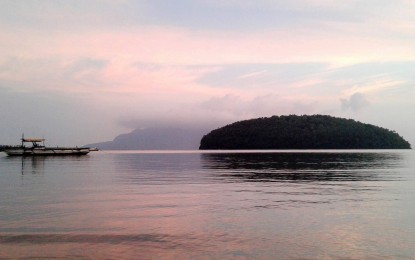
RED TIDE. The seawaters of Maripipi Island in Biliran province in this undated photo. the Bureau of Fisheries and Aquatic Resources on Wednesday (July 24, 2024) said red tide presence expanded in Biliran Island this week, with seven bays in Samar province still affected by the toxic organism. (Photo courtesy of Biliran Island FB page)
TACLOBAN CITY – Red tide presence expanded in Biliran Island this week, with seven bays in Samar province still affected by this toxic organism, the Bureau of Fisheries and Aquatic Resources (BFAR) said on Wednesday.
In its advisory, the agency said red tide has also been detected in the coastal waters of Biliran province, based on the latest seawater sampling.
BFAR said seven bays in Samar province have been contaminated with red tide toxins, with some parts of the sea showing red discoloration.
Toxins were found in the waters of Villareal Bay; Daram Island; Zumarraga Island; Maqueda Bay in the towns of Jiabong, Motiong, Paranas, San Sebastian, Calbiga, Pinabacdao, and Hinabangan; Cambatutay Bay in Tarangnan; Irongirong Bay in Catbalogan City; and the coastal waters of Calbayog City, all in Samar province.
On July 23, the coastal waters of Guiuan and Matarinao Bay in the towns of General MacArthur, Quinapondan, Hernani, and Salcedo were cleared from red tide infestation.
“The interplay of unusual weather patterns is seen to have a direct impact on unpredictable weather conditions in Eastern Visayas. El Niño and the onset of occasional heavy rainfalls could have triggered the upwelling of inner shallow bays, bringing up sediments laden with red tide microorganism cysts,” the BFAR regional office said in a statement.
“These microorganisms then used the organic load that comes with the sediments to start the bloom. This occurred as a series of events in different inner bodies of water, and was further intensified by the ever-changing current patterns in these areas, further spreading the red tide blooms,” it added.
Currently, a red discoloration has been observed in some parts of the Samar Sea. According to the analysis of seawater taken from this area, there is the presence of Pyrodinium bahamense, a toxic microorganism that causes paralytic shellfish poisoning.
A red tide occurs when certain types of algae grow out of control. The name “red tide” comes from the fact that the overgrowth of algae can cause the color of the water to turn red
The visible red discoloration indicates a high presence of toxic microorganisms.
The public is strictly advised not to collect, sell, or eat any type of shellfish, including small shrimp from the Samar Sea, the BFAR advisory said. (PNA)
